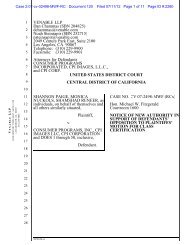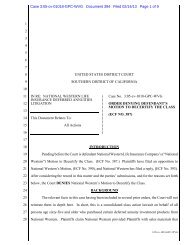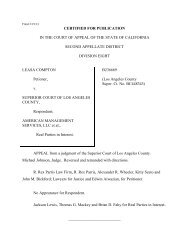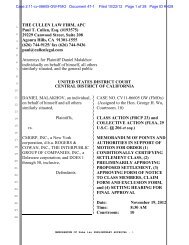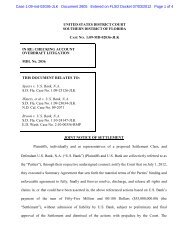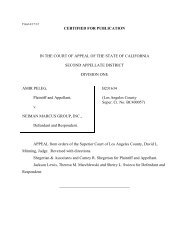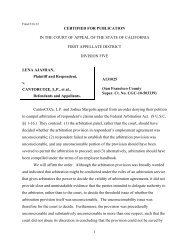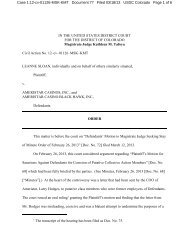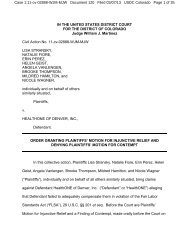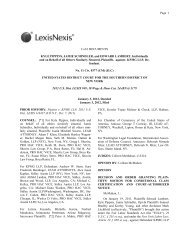here - Impact Litigation Journal
here - Impact Litigation Journal
here - Impact Litigation Journal
You also want an ePaper? Increase the reach of your titles
YUMPU automatically turns print PDFs into web optimized ePapers that Google loves.
2012 Tex. App. LEXIS 1089, *<br />
Page 4<br />
but holding that "the district court abused its discretion<br />
by failing to attach appropriate significance to the Johnson<br />
criteria most pertinent to reasonable attorneys' fees<br />
and by neglecting to develop fully the reasons for his<br />
award").<br />
3 As the dissent points out, the trial court's letter<br />
states that it "should not be considered an exhaustive<br />
or complete discussion of all considerations<br />
given to the Motion for Final Certification<br />
prior to the court's ruling t<strong>here</strong>on," and it was not<br />
intended [*11] to be findings of facts and conclusions<br />
of law. It is, however, the only insight in<br />
the record into the court's reasons for its judgment<br />
and we consider it for what usefulness it<br />
provides.<br />
4 Plaintiffs' fourth issue challenges the award<br />
as failing to consider the undisputed evidence that<br />
the requested amount was reasonable. As we<br />
stated above, we agree that the trial court ignored<br />
the uncontroverted evidence on the reasonableness<br />
of the requested award. Thus, we could alternatively<br />
reverse the award on the grounds asserted<br />
in Plaintiffs' fourth issue.<br />
The dissent would have us remand the case for further<br />
proceedings. In this case, however, we do not think<br />
remand is necessary. See Tex. R. App. P. 43.3 ("When<br />
reversing a trial court's judgment, the court must render<br />
the judgment that the trial court should have rendered,<br />
except when: (a) a remand is necessary for further proceedings<br />
. . . ."). The record before us contains all of the<br />
affidavits and records submitted in support of the request<br />
for attorneys' fees, and the testimony presented was not<br />
contradicted by any other witness or attendant circumstances<br />
but instead was clear, positive, and free from<br />
circumstances tending to cast suspicion [*12] t<strong>here</strong>on.<br />
In the interest of judicial economy and our duty to render<br />
judgment unless remand is necessary, we review the evidence<br />
and render the appropriate judgment. See id.;<br />
Ragsdale v. Progressive Voters League, 801 S.W.2d 880,<br />
882 (Tex. 1990) (rendering a judgment on attorneys' fees<br />
"[i]n the interest of judicial economy"); see also Louisiana<br />
Power & Light Co. v. Kellstrom, 50 F.3d 319,<br />
325-26 (5th Cir. 1995) (choosing to exercise its option to<br />
modify an award of attorneys' fees "[b]ecause the record<br />
contains sufficient information to allow a fair determination<br />
of a reasonable fee"); Sidag Aktiengesellschaft v.<br />
Smoked Foods Prods. Co., 960 F.2d 564, 566-67 (5th<br />
Cir. 1992) (rendering instead of remanding when sufficient<br />
evidence existed in the record because "no useful<br />
purpose would be served by further delaying [the case's]<br />
final disposition, not to mention exposing the parties and<br />
this court to yet [another] appeal").<br />
A. Calculating the lodestar<br />
The lodestar is calculated by multiplying the number<br />
of hours reasonably spent by counsel on the matter by a<br />
reasonable hourly rate. Dillard Dep't Stores, 72 S.W.3d<br />
at 412; Guity, 54 S.W.3d at 528-29. Plaintiffs submitted<br />
roughly 7,370 hours [*13] at various rates from $200 to<br />
$845 per hour for a lodestar of $3,972,367.75. We will<br />
review the evidence supporting both the number of hours<br />
and the hourly rates requested.<br />
1. Hours<br />
With their application for attorneys' fees, Plaintiffs'<br />
counsel presented no evidence in the twenty-one attached<br />
affidavits by the attorneys that their hours or their rates<br />
were reasonable. With their motion to modify, Plaintiffs<br />
submitted twenty more affidavits from the attorneys. 5 In<br />
all but five of those affidavits, the attorneys testified that<br />
the hours spent by their firm on the case were reasonable<br />
and necessary. 6 All of the firms detailed in their affidavits<br />
the tasks that the attorneys accomplished, such as<br />
researching, drafting, and filing; reviewing documents;<br />
responding to discovery requests; conducting depositions;<br />
and negotiating the settlement.<br />
5 One firm that had submitted an affidavit with<br />
the application did not submit a second affidavit<br />
with the motion to modify.<br />
6 Of the 7,369.9 hours submitted, the number<br />
of hours without direct testimony supporting their<br />
reasonableness and necessity equaled 386.35, or<br />
5.2% of the total hours submitted.<br />
Plaintiffs also submitted the affidavits of expert<br />
witness [*14] Geoffrey P. Miller. 7 Miller and Craig<br />
Enoch also testified at trial. In his affidavit, Miller<br />
opined that based on his review of the hours billed by the<br />
attorneys, "[t]he hours spent appear reasonable for the<br />
tasks accomplished." He further stated, "Considering the<br />
huge amount of work done as described in the submissions<br />
in support of the fee application, this time is, in my<br />
experience, consistent with the time needed to properly<br />
litigate a case of this type and magnitude." He noted that<br />
"expertise of the Plaintiffs' firms contributed to efficiency<br />
and reduced hours" and that,<br />
W<strong>here</strong> practical and appropriate, work<br />
appears to have been performed by associates,<br />
paralegals[,] and law clerks. By<br />
far, the overwhelming bulk of the work<br />
was done by attorneys with the appropriate,<br />
but not excessive, seniority to handle<br />
level-appropriate aspects of the Actions.<br />
In sum, based on my review of the affidavits<br />
of counsel submitted with the Final<br />
Approval Motion and wit[h] this Motion,<br />
my analysis indicates that Plaintiffs'



